![]()
January 2002
(Guest stars: Jason Isaacs, Orlando Bloom, Colonel Tom Matthews)

Transcribed by Alicia Screencaps by Meryl
Judy: It took place in Mogadishu when a crack team of US Rangers attempted the daring capture of Somalian warlords. Itís set up a lot of controversy in the states because of its similarities to the current war on terrorism in Afghanistan. But itís also been very well received by movie audiences. Hereís a tester.
(Shows clip of ďBlack Hawk DownĒ)
Judy: Well, here with us now are two of the stars from the film, Jason Isaacs and Orlando Bloom and also Colonel Tom Matthews, who was actually there and actually witnessed that incident for real back in 1993. And you were also a special advisor on the film.
Tom: Certainly was (nods)
Judy: Okay, weíll talk to you in a minute. (turns to Isaacs and Bloom, who are sitting together on the sofa) You look very different from the last time I saw you. The last time I saw you (speaking to Bloom)
Jason (wearing blue jeans and a black sweater): Was naked in the dressing room. (everyone laughs)
Judy: Well, wait Ďtil they find itÖ(waits for the to show a picture of Bloom as Legolas from LOTR)
Orlando (wearing a long-sleeved button down blue and white pinstriped shirt): Oh, look. Yeah, that is different, isnít it? (smiles and rests his cheek on his hand)
Judy: Very sweet.
Orlando: Oh, thank you. (him and Judy laugh and he points at her) Yeah, same to you.
Richard: That was you as Legolas in Lord of the Rings, yeah.
Orlando: (nods) That
was me as Legolas in Lord of the Rings. 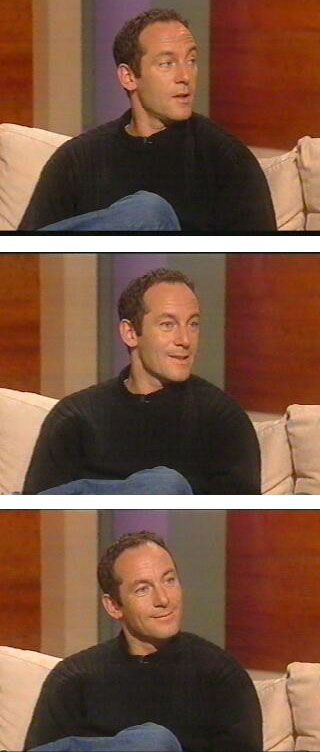
Richard: The elf
Orlando: Thatís right.
Judy: Did you haveÖI thought initially it was Leg-I havenít read it ya see, and I thought it was Legless (starts laughing) every time somebody said your name.
Orlando: (puts head bashfully to the side) Oh please, now Iím going to have that forever and ever (looks up at the ceiling, smiling) and ever.
Judy: (biting her nail and smiling) Iím serious, I think everyone is going to think that.
Orlando: Iím gonna be sitting in a pub and theyíre gonna go, ďCome on, Legless, get legsĒ.
Judy: Are you in the next one?
Orlando: Um, yes. It goes, Iím in the next two actually, which is..
Judy: Right
Orlando: Which is gonna get (scratches back of his head nervously and turns to the side, mumbling)
Judy: Itís a rumor that Jason, youíre gonnaÖ
Jason: Donít you think he looks like Caprice with his wig? (runs a hand over top of his head)
Judy: Yes I know (laughs)
Jason: Like a Vulcan version of Caprice.
Richard: Letís see it again, Jasonís version of the hair (laughing)
Jason: Sorry
Judy: Thereís a rumor that youíre going to be in the next one as well.
Richard: No, thatís Harry Potter. The next Harry Potter.
Jason: No, Iím in the next uh. No, Iím not, what am I saying (smiles and gestures with his hand) Iím not allowed to say that (makes a fist and laughs nervously, shaking his head and licking his lip)
Orlando: (laughs) Yeah, I wouldnít want to get kicked out of that one.
Jason: I donít know where that came from. No, I might be in the next Harry Potter.
Judy: Thereís a rumor that you might be Draco Malfoyís dad.
Jason: (leans forward a bit and locks his fingers around his crossed knee) That would be fantastic, wouldnít it?
Richard: Yeah
Judy: Yeah.
Jason: Yeah, that would be great.
Richard: Alright, before we move on to what weíre really here to talk about, have you seen both films, Rings and Harry Potter?
Jason: Uh, I have, yeah (nods slightly, instantaneously becoming more serious)
Richard: Which one do you go for?
Jason: (looks surprised for a moment, then arches his eyebrows and bursts out laughing) Well, obviously since one of them may be paying my bills and putting food in my babyís mouth soon,(rubs hands together) that would have to be Harry Potter.
Richard and Judy both laugh.
Orlando: (turns toward Jason) But youíre sitting next to me, Jason.
Jason: (apologetically)
I know. Uh, isnít he fantastic with his bow? (acts
like heís pulling arrows from his back and shooting them with a bow)
You see him with his bow? 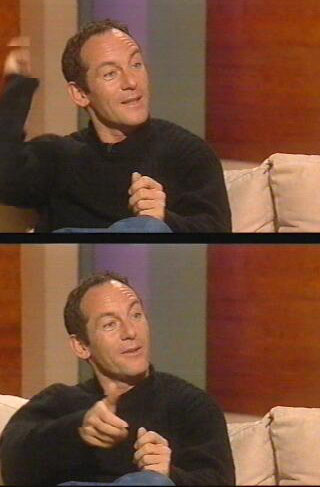
Richard and Judy laugh.
Jason: He does all that, thereís no special effects at all.
Orlando: (arches his eyebrows and smiles before turning to Jason again) Two months of training that was.
Jason: Yeah, but enough about Black Hawk Down. (everyone laughs) Which comes out tonight.
Richard: No, I went and saw it last Sunday morning with my son and a couple of his friends and itís terrific, itís a really good film. Umm, and because most of us who followed what actually happened ten years ago in Mogadishu, umm, understand these sequence of events. It seems to me, anyway, a faithful rendition of what went wrong and then what was retrieved. Weíll talk to you about that in a second.
Jason: (quite a few hand gestures here) Itís an amazing thing that Hollywood decided to spend a hundred million dollars on something that is essentially a documentary. The great difference between this and any other war film thatís ever been made, I think, is that this story is not devised for our promotional satisfaction, this is exactly what happened.
Richard: Right.
Jason: And all the soldiers whoíve seen it, in fact all the people (gestures at Colonel Matthews) who saw it with Tom in Pentington (the sound is kinda blurry on my copy so I canít tell if he said Pendleton or Pentington) last week, said theyíve never seen modern war so faithfully recreated and uh, itís very harrowing but itís nice that the audience is treating it intelligently.
Richard: Itís on a par with Saving Private Ryan in terms of the absolute realism, I think.
Orlando: (scratching behind his ear) Yeah, itís a brave film. I mean, Ridley, ya know, he took it on aÖI mean nothing was happening before, obviously September 11th by then shooting was all in the can, but you know, itís uncompromising and heís used, like obviously itís Ridley Scott, and his use of the camera, his cinematography is whatís so amazing and it kind of lulls you in, ya know. And youíre kind of, youíre lulled in by this beautiful cinematography and the music and into this sort of horrific, sort of real life events.
Judy: I found it intriguing that they cast English actors though.
Richard: So many of them
Jason: Once youíre in that kind of hell and it goes on for long, ya know itís the biggest firefight since Vietnam that the American army has been involved in. Thereís not that much talking (tilts head). So uh, I donít know that the accents were that much of a problem (smiles slightly)
Richard: But English actors, on the whole, tend to do American accents not so well. But I must say I forgot youíre English, all of you. And Iím not just saying that Ďcause youíre sitting there, really. In fact sometimes I wondered if I was wrong and it wasnít you.
Jason: Right (here comes that smile creeping up again)
Richard: Seriously, because you were so authentic, ya know.
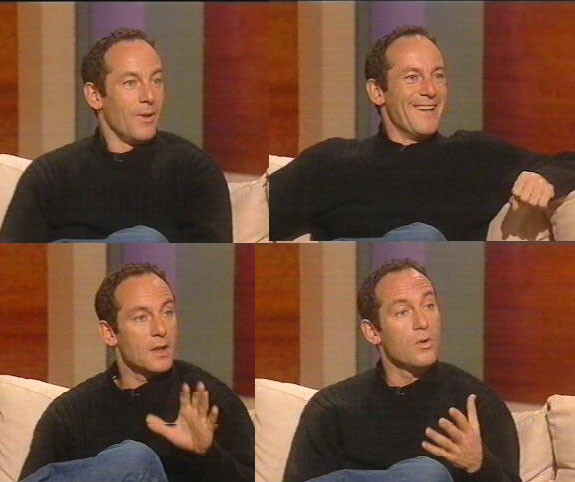
Jason: Well, we went to train with the Rangers at Fort Benning, who are amazing, good men who uh, the very same guys who opened themselves up to us. They were amazingly emotionally vulnerable, the veterans of this war and theyíre only 26 and 27 now. And they subsequently came with us to the set and now, unfortunately most of them are in Afghanistan. And uh, we spent so much time with them that you become military and we (gestures to Orlando) were sponges when we were there.
Richard: There was, umm, there was that terrible incident in Northern Ireland, many years ago, 12, 13, 14 years ago when two Army men accidentally drove into a funeral session and there were TV cameras there. And you saw these two poor guys pulled out of a car and savagely beaten and dragged away and they were murdered. And umm, there was a sense in the viewing audience at home of utter helplessness, of watching this happen only a few hours before. And Tom thatís what I thought about you (turns to Colonel Matthews) in that situation because you were really up there, above these streets of Mogadishu circling at a safe distance, well not that safe, but you know, you were out of the line of fire in a big helicopter watching your men being butchered, being murdered. Seeing it happen and being powerless for several hours or more than several hours to do anything about it. It must have been terrible. I mean, youíre trained to deal with situations like that but it must have been a nightmare that went on and on and on.
Tom: Well, in a reflective way it certainly is now when you look back on it and think of it. At the time, everybody was intensely focused. Everybody had very serious problems that they were dealing with and uh, there was no time for reflection. It speaks of the training and the reaction and how well everybody did on the ground because of how well they are trained. They just moved, reacted and dealt with everything that was thrown at them and there were some tremendous feats of heroism out there.
Judy: Although that whole initiative was taken with the best of intentions, which was to enable food to get through to the people, youíve since been very critical of it.
Tom: (looks a tad surprised) Me? Me personally?
Judy: Yes
Tom: Well the food business, no one was dying of starvation when we got there. The food was, in that situation, remedied probably eight months before.
Richard: Can I just summarize that? The situation that drew you in apparently was that the warlords were hanging onto the food.
Tom: Sure 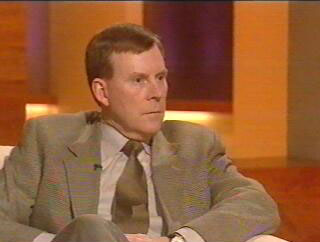
Richard: To give them power, how people were starving. And you went in there, aide to secure that food and then maybe pull out just as youíre searching for the Taliban now and searching for Osama Bin Laden, you went in there to pull out some of the main players in the war.
Tom: Right, and the real reason was it was a UN mandate. In June of that year, the certain portion of a clan ambushed and butchered twenty-four Pakistani peace-keepers that were there on that same piece, keeping peace enforced. That act occurred and subsequently they said we need to do something about this and the UN wanted us in there to do that. So thatís the main reason we went in there.
Richard: Right and the plan was for a one hour snatch, you went in by chopper, you dropped the Rangers, they went in, they grabbed the cabinets of the warlords, pulled them out and it will all be over in sixty minutes.
Tom: Right
Richard: What went wrong? Because it was a disaster. What went wrong?
Tom: Well, I think thatís an interesting question and certainly one that people always wonder about. And the reason is this, the media, by and large is not in the country. The media had left. It had become too dangerous. CNNís drivers, for example, had been pulled over, robbed, shot and killed. And it was just a very dangerous environment. What really wasnít understood by, I think, the audience at large in the world and the American people at home was we were conducting combat operations. During combat operation, youíre firing live rounds and people didnít understand that we were conducting these missions like that.
(Camera pans to Isaacs and Bloom, who are sitting there with very interested, stunned looks on their faces)
Tom: Because of that, without the absence of media there, with the absence of media (corrects himself) when the video images came on the TV in everyoneís living room, everyone was shocked because they had no understanding that we were doing this. SoÖ
Judy: So the media really is that powerful.
Tom: Oh absolutely, I mean you donít know what you donít know unless somebody informs you and by and large the media was not in that country at that point.
Jason: Well, so what went on that day, to make the mission not last the half an hour it was meant to last, is a couple of these magnificent beasts, these helicopters got shot down and the reason that the fight lasted for eighteen hours, all night, is that these men refused to leave a body behind. Itís a creed that they live by. Itís actually a written creed.
Richard: The Rangers.
Jason: (scratches nose with thumb) The Rangers wonít do it and all of the Rangers who survived told us when we were training with them, their first thought when the helicopters got shot down was ďget me to the crash site. Get me right there nowĒ and most of us, us normal mortals would think ďget me out of here. Just get me on a bus and get me out of here straight away, itís all going pear-shapedĒ. And the reason it took all night is they refused to even leave the dead bodies behind. And umm, itís funny that you call it, ya know, a disaster. If we went after a couple of Bin Ladenís lieutenantís and managed to get them as they did indeed get these people they were after and managed to kill about a thousand of the enemy and injure many more and lose eighteen of our side.
Richard: Weíd have a triumph on our hands.
Jason: It would be a bit of a
triumph. So they achieved their mission, the people who fought there, in fact
when we left..(hitches
his thumb at Orlando) 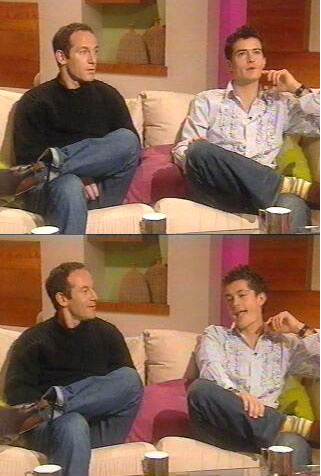
Orlando: The guys on the ground were, ya know, theyíre heroes. They were definitely heroes. There were decisions made further up the chain that maybe werenít (shrugs) didnít help. Thatís one thing when youíre a Ranger, itís called Ranger Orientation, you learn that these guys are the bravest men Iíve ever known.
Jason: They gave us a note the day we left. They slipped a note under our door, anonymously written, and it said, ďThank you for your help but please show the world that no man who dies for his brother dies in vainĒ. And it was signed by ďthe dead RangersĒ. And they, none of them think that it was a disaster at all.
Richard: Fair enough.
Judy: Just to come back to Tomís point about the media, the reason the situation you outlined possibly was an operation which caught two of Bin Ladenís biggest henchman. Yes, youíre right it was a triumph but that was because of the twin towers, isnít it? Thatís because everybody in America, itís the media, not the media but itís peopleís perception.
Tom: Youíre definitely right and at our level, the tactical level, the soldier level, it was a complete success. We accomplished our mission that day. It was live rounds, therefore people got injured in that situation and everybody reacted heroically.
Richard: Yeah. Thanks a lot for being here.
Tom: Certainly
Richard: Thank you two. Congratulations on the film. Itís utterly fantastic.
Jason: Itís an amazing experience to watch this film. Itís not like any other Hollywood film thatís ever been made.
Orlando: Yeah, absolutely.
Richard: Okay, well thank you all.
Judy: Thank you.
Richard: Black Hawk Down, whenís it open?
Jason: (looks at watch) Apparently a half an hour. Well, watch the end of the show and then run out and buy a ticket.
Richard: (cups his hands at his mouth) Come back! (starts laughing)